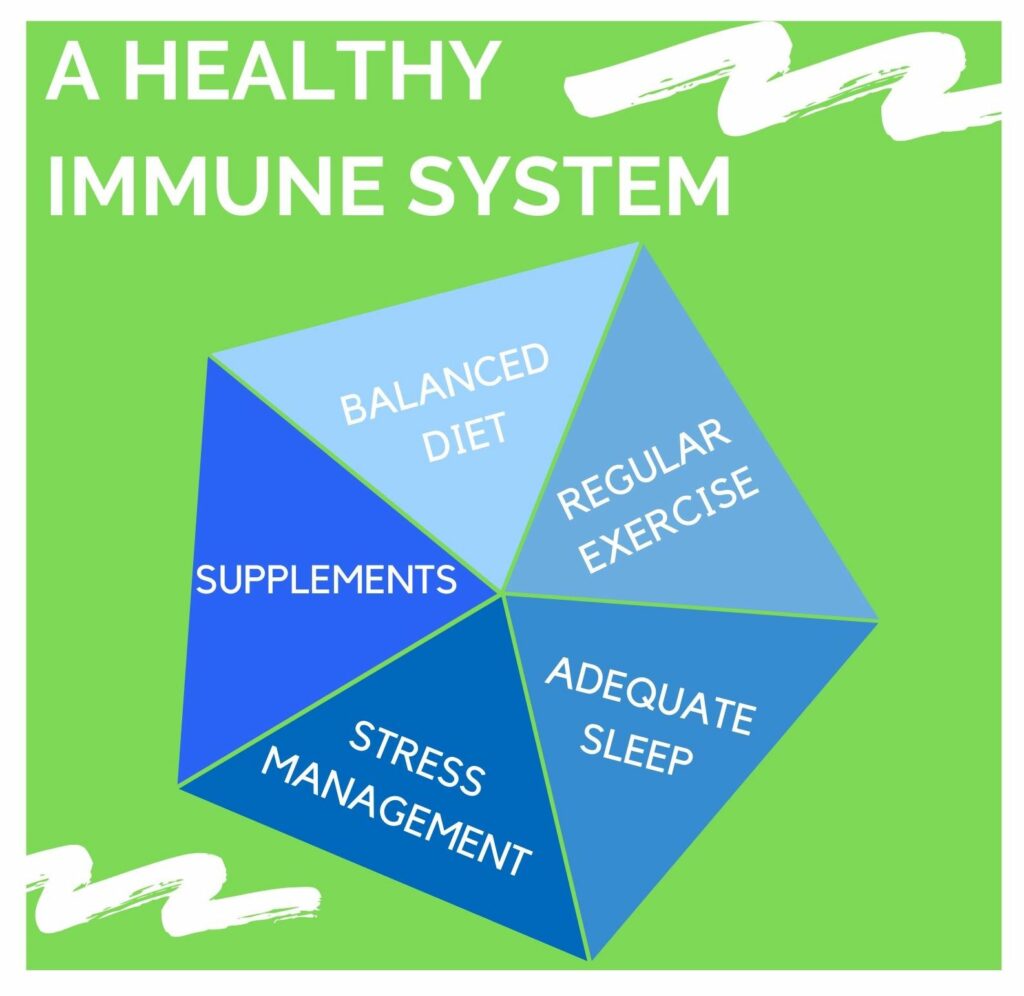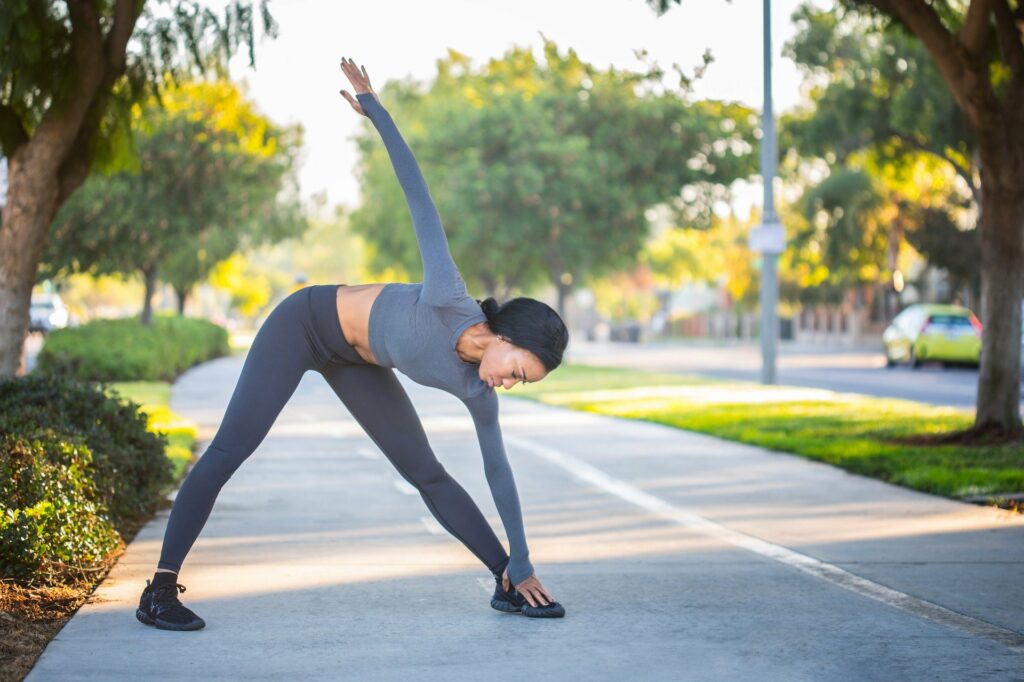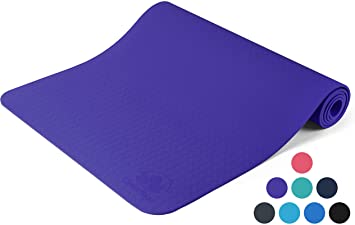In a news article I was recently interviewed for, one of the questions I was asked is one that many are asking today: “What is the best way to boost the immune system to protect from illness and disease?” As a registered dietitian and fitness instructor, I am well-versed on the many lifestyle factors that contribute to a strong immune system. In this article, I simplify the enigmatic immune system and give my top five tips on how to boost the immune system naturally so that you can get started today!
The immune system is the body’s personal army made up of countless cells, tissues and organs. It protects against unwanted illness, infection and disease. By identifying harmful cells, an effective immune system is able to eliminate invaders and keep us healthy.

What Happens When You Don’t Have a Properly Functioning Immune System?
Just ask one of the tens of millions of people worldwide who suffer from immunologic disorders such as eczema, type 1 diabetes, celiac disease and rheumatoid arthritis. These conditions indicate a deficient or malfunctioning immune system. Autoimmune diseases cause the body to destroy its own healthy cells, leading to chronic illness. The immune system can even overreact to allergens in the environment that are typically safe. These allergens include pollen and food, creating conditions like asthma and food allergies.
For the general population without immunologic disorders, there are still dangers of having a weak immune system. If you are unable to fight off bacteria and viruses (such as the novel coronavirus, COVID-19), you have a higher likelihood of getting sick and longer duration of staying sick. And who wants that?
Although there are no “quick fixes” to build a strong immune system overnight, here are the top five ways to boost your immune system naturally.

1. Eat a Balanced, Colorful Diet
There is no question that eating a healthy diet strengthens the immune system. Food, full of essential nutrients, vitamins and minerals, is our body’s primary source of fuel. Think about it like this: would you fill your car up with gasoline that you know would hurt the engine? No, because it would perform poorly and damage the automobile long-term. Apply this same concept to yourself.
Are you supplying your body with the highest-quality fuel, or are you doing more harm than good?
Time and time again, research has shown that eating a whole-foods, plant-based diet is the healthiest eating pattern to adopt. This does not mean you have to eat vegan, follow strict diet guidelines or cut out all sugar forever. It’s simple – just eat more plants and less processed food. Make “eat the rainbow” your new motto (and no, I’m not talking about Skittles).
A good rule of thumb to follow is to fill at least 50% of your plate with color. That means that non-starchy vegetables (like leafy greens, carrots and peppers) and fruit should make up half the plate. The other half of your plate should be made up of equal parts of high-quality carbohydrates and lean protein.
“Eating the rainbow” ensures that you are giving your body all of the essential vitamins and minerals that it needs. Every color found naturally in fruits and vegetables signifies a different phytochemical, naturally occurring plant chemicals that are beneficial to our immune system and overall health. For example, blueberries get their color from the flavonoid anthocyanin and carrots from the carotenoid known as beta-carotene.

So, how does a healthy diet support a healthy immune system?
A balanced diet full of anti-inflammatory foods like fruits, vegetables, complex carbohydrates, nuts, seeds and legumes will help prevent any deficiencies that would weaken the immune response.
If you are one of those people that cannot eat a vegetable unless it’s deep-fried or covered in ranch dressing, you may need to consider a dietary supplement or multivitamin to reach your daily needs. Keep reading to see what essential nutrients you might be missing out on.
2. Supplement Wisely
When was the last time you checked on your micronutrient status? According to the World Health Organization, more than two billion people suffer from micronutrient deficiencies worldwide. Some of the most common deficiencies in America include Vitamin A, D, C, E, calcium and magnesium.
So, how to boost the immune system naturally? Increase the intake of supplements that are most beneficial to your health.
The following are the vitamins and minerals that will best support your immune system.
Vitamin C
Vitamin C has garnered praise as an immune-boosting champion, with people doing everything they can to increase their intakes by chugging Emergen-C or buying every promising supplement they find in Whole Foods. Although there is no evidence to support the claim that vitamin C can “boost” our immunity in the short-term, it plays a critical role in strengthening the immune system long-term.
Consuming an adequate amount of this vitamin is crucial. Vitamin C is essential in activating the immune system against invaders to prevent infection, illness and inflammation. To benefit from this vitamin’s antioxidant potential and prevent deficiency, the Recommended Dietary Allowance (RDA) is 75 milligrams (mg) for women and 90 mg for men. The RDA is slightly higher for pregnant or lactating women, smokers and those with malabsorption.
How to Boost Vitamin C:
Eat more foods high in Vitamin C.
- Green and red bell peppers
- Oranges/Orange Juice
- Grapefruit/Grapefruit Juice
- Kiwifruit
- Strawberries
- Broccoli
- Brussels sprouts
Take a vitamin C supplement. If you cannot get enough vitamin C through dietary sources, there are plenty of supplements available. Check out this one from Nature’s Bounty. It is important to note that excessive intakes of vitamin C, or any vitamin or mineral for that matter, can be harmful. Consult a physician or dietitian before taking the plunge.
Vitamin D
Vitamin D may be a key player in regulating the body’s inflammatory response and defending from illness and disease. Over one billion people in the world have insufficient intakes of this essential vitamin. Immunology expert from Cleveland Clinic, Dr. Leonard Calabrese, states that even being mildly deficient in vitamin D can weaken the immune system. The good news is that this is an easy fix for most people.
How to Boost Vitamin D:
Eat more foods high in vitamin D.
- Fatty fish (e.g. salmon, tuna, swordfish)
- Egg yolks
- Fortified products (milk, cereal, orange juice, yogurt)
- Beef liver
- Cheese
Get outside for about 15 minutes of sunlight each day. You heard that right, getting a daily dose of sunshine can increase your body’s production of vitamin D.
Although the exposure time varies for individuals based on skin tone, age and other factors, the average recommendation is to expose at least 40% of the skin for 15-20 minutes daily to ensure you are promoting adequate synthesis of the vitamin in the skin. Those who are at high risk of developing skin cancer should take caution and consult a physician.
Take a vitamin D supplement like this one. If you cannot get enough vitamin D from your diet or the sun, a supplement may be necessary to maintain adequate levels. Consult a physician or dietitian to determine which supplement is right for you.
Zinc
The mineral zinc is essential to immune system function. Almost 30% of older adults suffer from zinc deficiency, so you may want to keep this mineral on your radar. In addition to its antioxidant potential, it plays an important role in immune cell development and helps manage the inflammatory response. Is a zinc supplement right for you?
How to Boost Zinc:
Eat more foods high in zinc.
- Oysters
- Alaskan King Crab
- Meat: beef, pork, chicken
- Beans
- Fortified cereal
- Pumpkin seeds
- Yogurt
- Cashews
Take a zinc supplement. Most multivitamins contain zinc, so check with a physician or dietitian to ensure that you are getting enough or if you need an additional boost. The RDA is 11 mg for adult men and 8 mg for adult women, both from food and supplement sources.
Additional Supplements
Other supplements that are currently being studied for their immune-boosting potential are B vitamins (especially B6 and B12), folic acid, iron, elderberry, echinacea and many more. Keep an eye out for further research that may just prove the benefits of these compounds.
3. Exercise Regularly
Did you know that physical activity can improve cognition, reduce anxiety and even improve insulin sensitivity on the same day that it is performed? If you continue this pattern, exercise provides even MORE benefits in the long run such as decreased risk of heart disease and some types of cancer.
Many of the clients I work with as a registered dietitian report tremendously positive changes in mental and physical health when incorporating exercise into their daily routines. However, the majority of Americans do not reach the minimum recommended amount of physical activity (150 minutes per week). Now that you know a few benefits of exercise, taking a jog around your neighborhood might not sound so bad after all.

In addition to the laundry list of good things that happen to our bodies and our minds when we exercise, it may even improve our immune function. Regular exercise supports our health and therefore supports our immune system. It improves circulation, meaning the cells of the immune system can get to the invader and destroy it quickly (Alexa, play Go Grease Lightning!). Moving our bodies on a daily basis also provides an anti-inflammatory effect, further reducing disease risk.
Not exactly a marathon runner quite yet? That is okay. Even moderate exercise, such as going for a fast-paced walk or doing yoga, helps to strengthen immune function. The most important thing is to just start somewhere.
How to Boost Your Immune System with Exercise:
- Start small. Try taking a 30-minute walk several days per week. Slowly increase in frequency and intensity until you reach the minimum recommendation of 150 minutes of moderate-intensity aerobic exercise per week.
- Experiment with different forms of exercise. There is no one-size-fits-all workout routine. The only rule is that you enjoy it! Try a yoga class on the Down Dog App, go for a run on a new trail or take that rusty bike that has not seen pavement in a few years for a spin. On second thought… maybe get a new bike before trying that last one.
- Working out at home? Motivate yourself with new equipment like a premium, extra-thick yoga mat or a colorful set of free weights. Nothing makes me want to whip out a quick 20-minute HIIT workout like a fresh set of blue resistance bands!

4. Manage Stress
It almost seems as though we have accepted high levels of stress as the norm these days. In trying to balance work, family, friends, a running list of chores that never seems to end and your sister’s best friend’s cousin’s bridal shower, stress is inevitable. While it’s impossible to eliminate, the toll it is taking on our bodies is forcing us to pay attention and do something to manage it.
MedlinePlus describes stress as a “feeling of emotional or physical tension”. Chronic stress, or stress experienced over long periods of time, increases the risk of a myriad of diseases. The list includes heart disease, diabetes, depression, anxiety and more.

Stress not only puts us at risk for many chronic conditions, but also weakens our immune system. Our body’s reaction to stressful events, either immediately or long-term, is to release a hormone called cortisol. This cortisol increase is helpful in the short-term because it reduces inflammation. However, sustained high levels of cortisol actually contribute to excessive inflammation and a weakened immune response.
High levels of chronic stress reduce the amount of white blood cells, the soldiers of the immune system army, in our body. This increases the risk of infection and decreases the body’s ability to fight it off.
So, what can you do?
How to Manage Stress to Boost the Immune System:
- Meditation: Regular meditation has been shown to lessen both the mental and physical impacts of stress. It allows for better management of stressful situations when they arise (like when you notice four missed calls from your boss), as well as easier recovery afterward. Interested in finding your inner Zen? Try a beginner’s course on the Headspace app.
- Exercise: As mentioned above, exercise is essential to building a strong immune system. Another bonus? It reduces stress, which also contributes to a strong immune system. A daily dose of movement boosts endorphins, improves mood and increases mindfulness. Get moving!
- Journaling: Take the time to write down five things you are grateful for each day. Jot down a few things that stressed you out. Copy a few quotes that make you happy. Putting pen to paper is a great way to boost your mood and shed some tension.
- Social Connection: FaceTime a friend, grab coffee with a coworker or do something kind for a neighbor. A strong emotional support system increases the ability to cope with stressful situations. It also alleviates negative feelings that contribute to chronic stress, such as loneliness and low self-esteem.
5. Get Enough Sleep
According to the CDC, over one-third of Americans get less sleep than the recommended amount. Are you one of those people that is constantly running on 5 hours of sleep and 4 cups of coffee?

The average adult should get at least 7 hours of sleep nightly. If your immune system doesn’t get enough sleep, you unfortunately can’t just give it a boost with a cup of joe in the morning.
During sleep, the body produces cytokines, which are proteins that help regulate the immune system’s response to infection and inflammation. Less sleep, less cytokines. Hitting the hay earlier may reduce your risk of infection and strengthen the immune response to bacteria and viruses.
How to Get Better Sleep to Boost the Immune System:
- Stick to a schedule.That means going to bed and waking up at the same time every day.
- Avoid electronics and bright lights before bed.They mess with the internal circadian rhythm, making it harder to fall and stay asleep.
- Establish a nighttime routine.Read a book, meditate or stretch before your head hits the pillow to signal your body that it is time to wind down.
- Exercise daily. (Do you notice a trend?) Exercise helps you fall asleep quicker and experience a higher quality rest.
- Assess the environment:temperature, noise, the comfort level of your mattress. Make the bedroom a relaxing, comfortable place to rest.
- Check out more tips and tricks here.
How to Boost Immune System Naturally: Final Word
Boosting the immune system is not as simple as taking a supplement or drinking more orange juice. A healthy immune system is built on a foundation of a balanced diet, supplementation when needed, plenty of exercise, quality sleep and stress management. Now that you know how to boost your immune system naturally, translate these top 5 tips into sustainable lifestyle changes and your immune system will be strong and healthy for life!
ABOUT THE AUTHOR:



